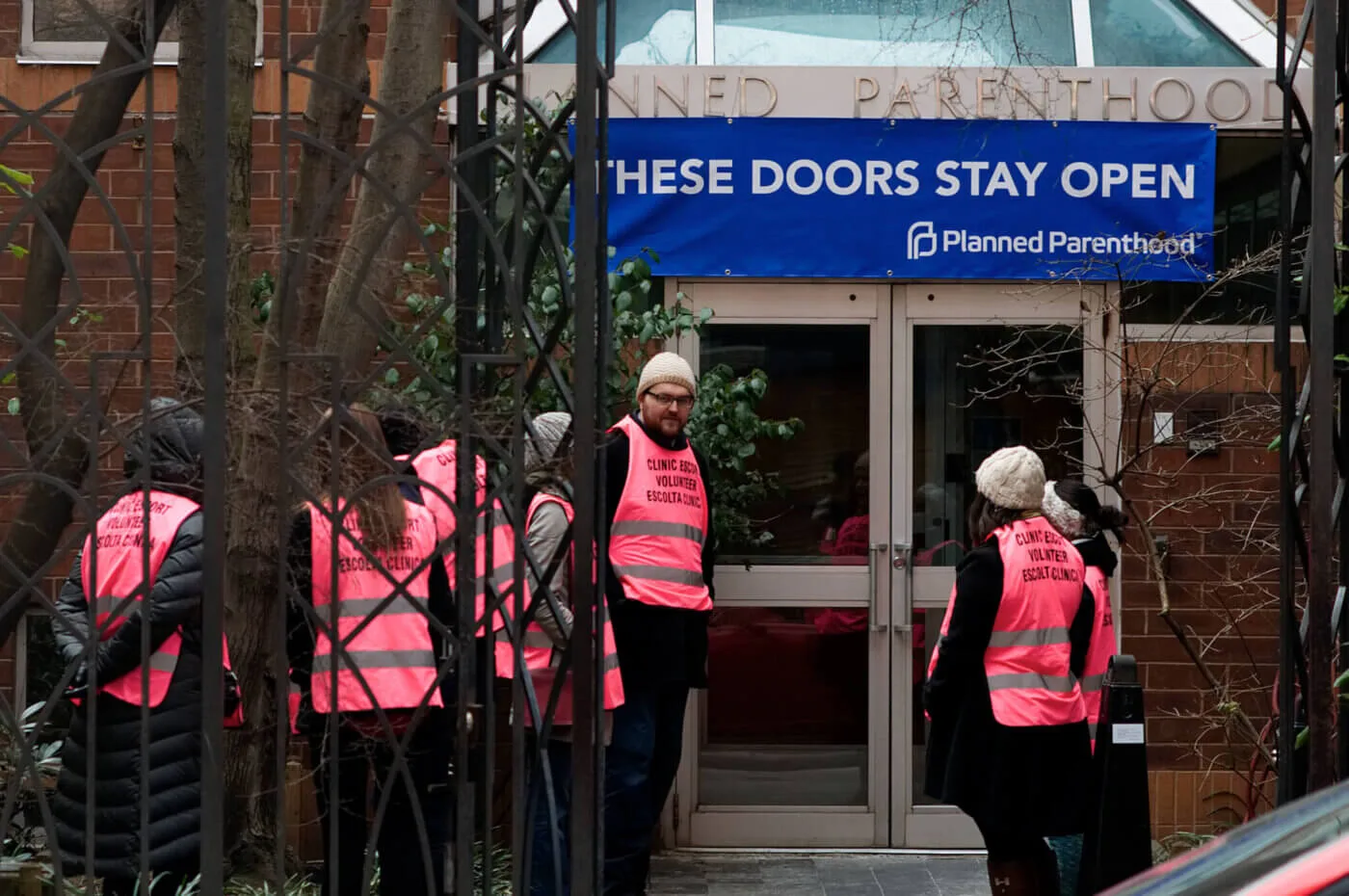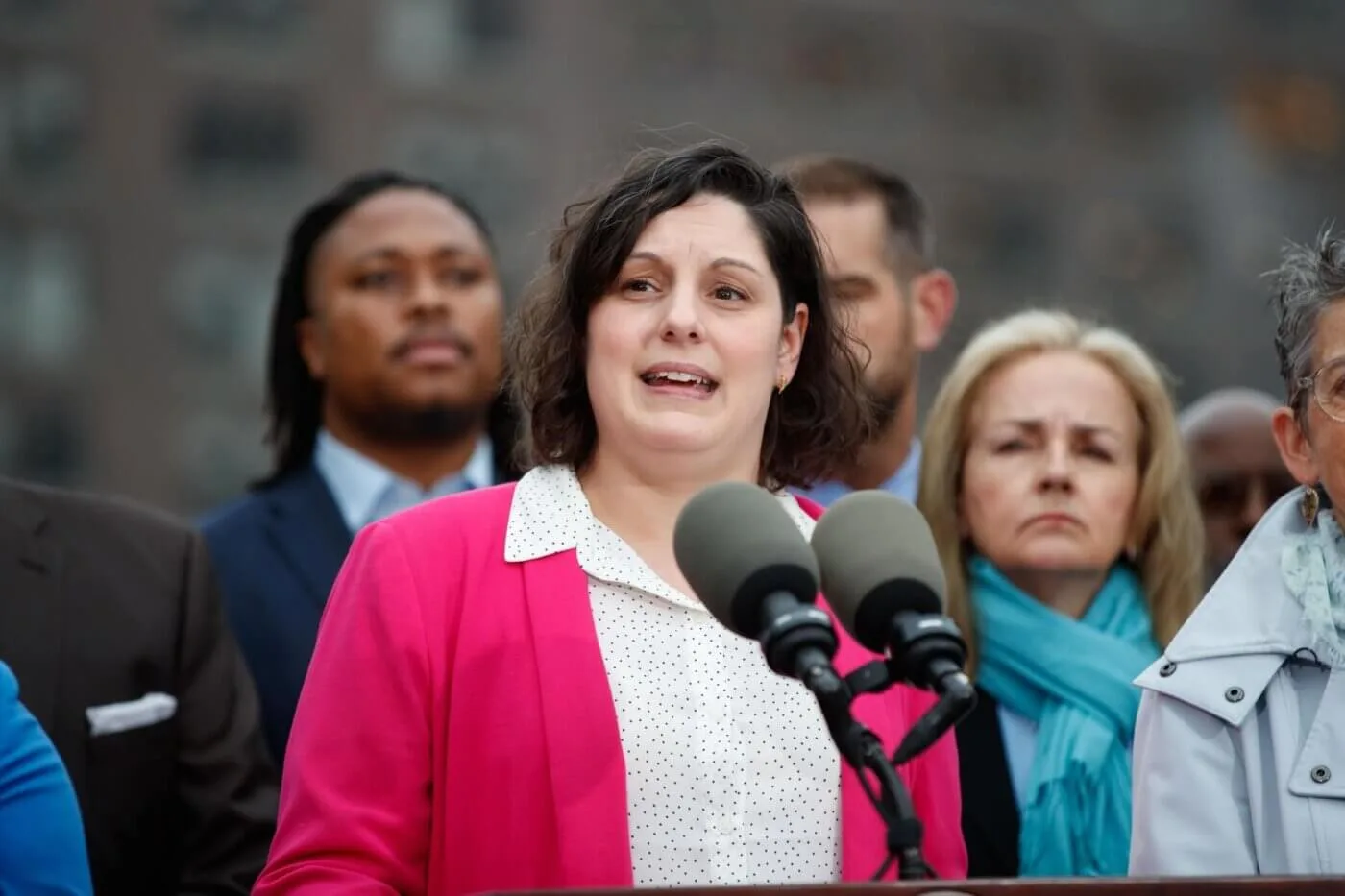
Protesters hold placards at a rally in Danville's Memorial Park. (Photo by Paul Weaver/SOPA Images/LightRocket via Getty Images)
She was 19 and pregnant, and thousands of miles from home, when she found out that her insurance wouldn’t cover an abortion. A similar scenario has happened to countless women in Pennsylvania, under a ban on Medicaid-covered abortions. Today, that ban is back in court.
Imagine walking into a health care facility for a medical procedure that you agonized over getting, only to be told that your insurance doesn’t cover it.
It happened to Signe Espinoza when she was just 19, a sophomore in college in Oregon. She was thousands of miles away from her home in Philadelphia.
“I felt like my life was ending,” Espinoza said.
Espinoza was at a Planned Parenthood clinic to get an abortion. She had Pennsylvania Medicaid insurance. The state-run insurance for adults and children with limited income and resources covers other reproductive health care in Pennsylvania, but does not cover abortions.
In 1982, Pennsylvania lawmakers enacted the Abortion Control Act, which banned Medicaid from covering abortion care except in the cases of rape, incest, or to save the life of the mother. The legality of the ban was challenged in 1985, but was upheld by the state Supreme Court.
It is now 2025 and times have changed, said Sue Frietsche, executive director of the Women’s Law Project.
“The world has changed. The court has changed. The law has changed,” Frietsche said. “People’s understanding of the importance of abortion for women’s equality has changed. Like radically. Abortion rights affect a woman’s ability to participate equally in employment, in education, in civic life. It affects your ability to steer the course of your own life.”
In 2019, Pennsylvania abortion providers filed a lawsuit challenging the state statute banning Medicaid funding for abortion. And just last year, the state Supreme Court held that the ban is sex discrimination under the state’s Equal Rights Amendment. Finding the ban “presumptively unconstitutional,” the justices sent the case back to the Commonwealth Court. To this day, the Medicaid ban persists.
“Every single day that this law is in effect, people are being harmed,” Frietsche said. “It is an injustice for this law to be allowed to operate for days and days, weeks and weeks, months and months.”
Why is this case important?
Over the years, we’ve learned more about what happens when people are denied access to an abortion, Frietsche said.
The Turnaway Study, conducted by the University of California-San Francisco, found that women who were denied an abortion and were forced to carry an unwanted pregnancy had a four-times greater chance of living below the Federal Poverty Level.
The study also found that being denied an abortion has serious implications for the children born from an unwanted pregnancy, as well as for the existing children in the family.
“It’s clear that the Medicaid abortion coverage ban inflicts tremendous harm, physical harm, mental harm, economic harm on people who are denied access to abortion because of it,” Frietsche said. “It’s a way of keeping women poor.”
In Pennsylvania, around 20,000 women on Medicaid use Planned Parenthood for all different types of reproductive health care every year—such as annual exams, birth control, STD testing, and prenatal and postpartum care.
The Medicaid ban affects the people who need it most, said Espinoza, who eventually did receive an abortion when she was 19. She has since become an advocate for Planned Parenthood and today is the executive director for Planned Parenthood Pennsylvania Advocates.
“Folks on Medicaid are working to make ends meet. We are talking about poor women, women of color, young folks,” Espinoza said. “These are all folks who are struggling to access abortion care and already face barriers to health care.”
What’s the case?
Allegheny Reproductive Health Center v. Pennsylvania Department of Human Services challenges the state’s Medicaid ban on funding abortions by arguing that it violates the commonwealth’s Equal Rights Amendment (ERA).
Pennsylvania’s ERA, adopted in 1971, guarantees that “equality of rights under the law shall not be denied or abridged in the Commonwealth of Pennsylvania because of the sex of the individual.”
Restrictions on abortion are sex-based classifications and are therefore subject to the ERA, Frietsche said, who is one of the lawyers in the case.
“Men get all the health care they need under the Medicaid system, but women are deprived of an extremely important and extremely common health care service that they need,” Frietsche said. “It’s unequal.”
The ERA was also enacted to end a gender hierarchy, she added.
“It was adopted so that sex and gender would no longer determine people’s legal rights or their legal obligations. When the ERA was adopted, its number one target was any law or government practice that entrenched these limiting gender stereotypes, that women had to be wives and mothers, men being breadwinners. And the Medicaid abortion coverage ban is one of those.”
The state Supreme Court agreed, ruling that equality on the basis of sex cannot exist when there are abortion restrictions. So the case was sent back to the Commonwealth Court to “apply the principle,” Frietsche said.
Basically, what the Commonwealth Court has to determine is if there are any less intrusive ways for the state to advance its interest. And there are, Frietsche said.
“There are a whole lot of programs that the Department of Human Services itself runs to advance maternal and fetal health that don’t rely on depriving people access to medical care.”
Support Our Cause
Thank you for taking the time to read our work. Before you go, we hope you'll consider supporting our values-driven journalism, which has always strived to make clear what's really at stake for Pennsylvanians and our future.
Since day one, our goal here at The Keystone has always been to empower people across the commonwealth with fact-based news and information. We believe that when people are armed with knowledge about what's happening in their local, state, and federal governments—including who is working on their behalf and who is actively trying to block efforts aimed at improving the daily lives of Pennsylvania families—they will be inspired to become civically engaged.


From clinics to crisis: Pennsylvania women will feel the pain of Medicaid cuts
In Pennsylvania, about one in every five women of reproductive age is enrolled in Medicaid. Dozens of family planning clinics throughout the state...

House GOP fast-tracks budget bill that would cut off Medicaid funding to Planned Parenthood
The budget package proposes steep health care cuts—and includes a new push to block patients from accessing reproductive care. In a 30-24 party-line...

State lawmaker wants to end mandatory counseling and waiting period for abortions in PA
A proposed bill from Democratic lawmakers would remove hurdles to getting an abortion in the state by taking away the currently mandated counseling...

Helping patients get in the door: The role of clinic escorts and the push for stronger legal protections in PA
At reproductive health care clinics across Pennsylvania, patient escorts are the first line of defense for abortion rights. These volunteers put...

Thousands of Pennsylvanians just had their reproductive health care halted by President Trump
Pennsylvania will lose a majority of its Title X funding—the only federal family planning program in the country. Planned Parenthood clinics, county...





